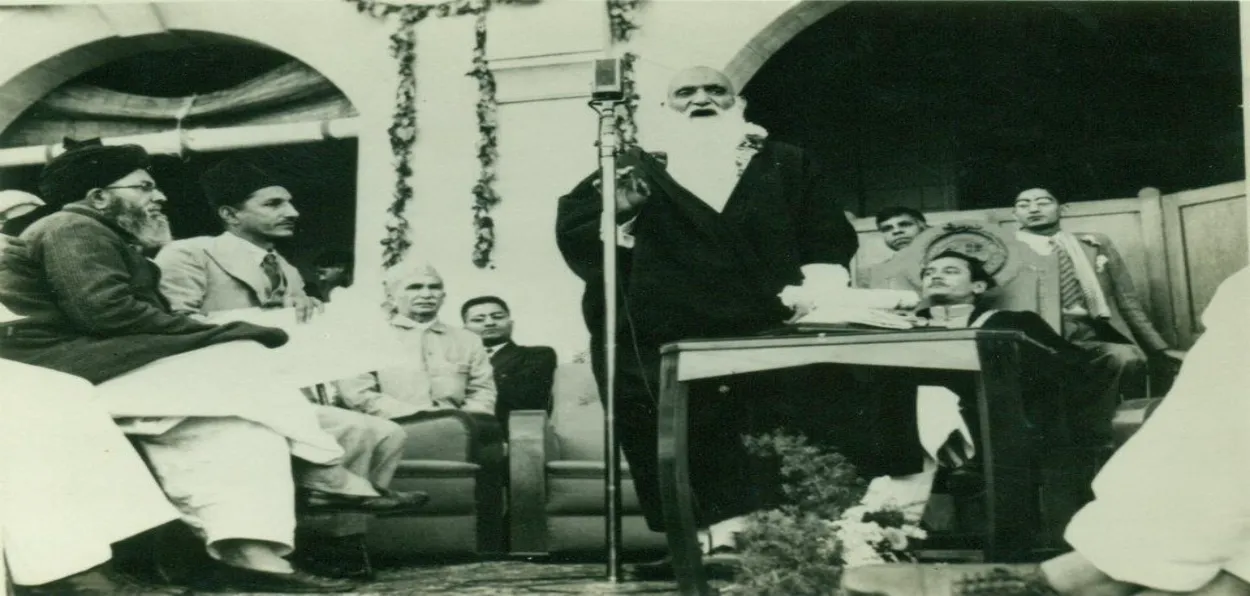
Saquib Salim
It is no secret that Mohammad Ali Jinnah-led Muslim League was supported by the British Government. The League served an important colonial agenda of dividing the Indians along religious lines. However, it is a less-known fact that at the peak of demand for Pakistan, Ulema strongly opposed divisive politics.
Maulana Ubaidullah Sindhi was a strong voice against the British policy and communal politics. He posed a serious threat to the designs of the British government. For those who do not know Maulana, the Rowlatt Committee Sedition Report submitted in 1918, which led to the infamous Rowlatt Act, of 1919, devoted three pages to the threat Maulana posed to the British Empire. He was, thus in the eyes of the British, the most ‘dangerous’ Indian revolutionary of his time.
After receiving his education from a madrasa in Deoband, Maulana organised revolutionaries in India before moving his base to Afghanistan during the First World War. He was instrumental in the forming of a provisional government of free India in Kabul with Raja Mahendra Pratap as its President and he served as the Home Minister.
Later on, he moved to the USSR and Saudi Arabia. Maulana kept preaching revolution to the Indian diaspora till 1939 when he returned to India.
In 1937, India India was given limited autonomy for internal affairs. This led to the forming of provincial ministries after the election. The Sindh Ministry led by Allah Bux Somroo lifted the ban on the Maulana so that he could return. The other provincial governments also supported him. Except Muslim League, all the major Indian political outfits campaigned for his return.
The British Government was unwilling to let Maulana return to India. Vice Consul at Jeddah, in a letter to the Government in Delhi, wrote, “Muslim League he did not favour and was bent upon joining the Congress. It was also a general belief that if he goes to Sindh and takes to active politics there would be trouble in Sindh too…. He is an authority on Quran and hadith. He intends to approach the Muslims through religion and divert them to Congress. As he does not believe in the forms of religion, saying prayers, fasting, etc., etc., he is likely to appeal to educated young men who may get moral support from the Maulana in not observing these forms of religion and yet claim to be good Muslims. So there is a risk of Obeidullah Sindhi's converting Jamia Millia into a Congress camp.”
It must be noted that the British wanted a formal apology from Maulana stating that he repented from his previous actions and would remain loyal to the crown. But, Maulana did not submit any written petition to this effect. In the letter thanking the government for the permission to return to India he wrote that it was a blessing of Allah that he could now come back to his ‘motherland - the land of his love’.
Secretary to the Government of India objected, “The information available to the Government of India as to his attitude and activities since 1932 is that they continue to be anti-British, Communistic and revolutionary. His letter above-mentioned contains no renunciation of his former views or undertaking to refrain from subversive activity.”
Rather, Maulana publicly declared that he would not stop being a freedom fighter once back in India. The only diplomacy he exhibited was that he said that he had become a non-violent agitator. Which of course was not true.
In a letter written to the Sindh Government, Maulana wrote, “My political creed follows the Interpretation of Islam given by Shah Waliullah of Delhi. As I can follow this creed by remaining within the Indian National Congress and as I do not find in it against non-violence, the creed of the Indian National Congress becomes my creed also…. I have accepted Mahatma Gandhi's philosophy of non-violence since 1924.”
In reality, Ubaidullah did not meet Mahatma Gandhi but Subhas Chandra Bose. According to a letter written by Maulana Abul Kalam Azad to Maulvi Zahirul Haque, which was printed by Golam Ahmed Mortaza in his Bengali book Chepe Rakha Itihas since coming back to India, Ubaidullah had confided in Azad that he wanted to send Netaji abroad for a final battle against the British.
Azad further claimed that Netaji and Ubaidullah met in Delhi to talk about the future of the Indian Freedom Struggle. The letter further notes that they again met in Calcutta (Kolkata) after a few months where Ubaidullah handed over important letters of reference and documents which had to be given to Japanese authorities.
ALSO READ: Khwaja Hasan Nizami used Sri Krishna's story to unite Indians
Maulana and Bose met before the latter moved out of India to lead Azad Hind Fauj while Maulana led an anti-League movement in India to defeat communal politics.
Maulana was murdered in 1944 due to poisoning; he died fighting the colonial powers and the communalism of Muslim League..
